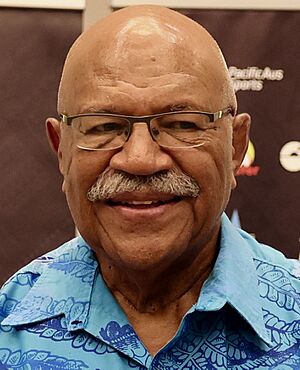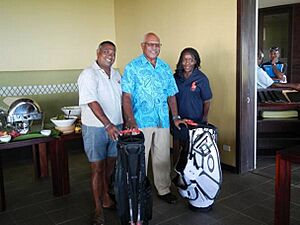Sitiveni Rabuka facts for kids
Quick facts for kids
Sitiveni Rabuka
CF, OBE, MSD
|
|
|---|---|

Rabuka in 2023
|
|
| Prime Minister of Fiji | |
| Assumed office 24 December 2022 |
|
| President |
|
| Deputy |
|
| Preceded by | Frank Bainimarama |
| In office 2 June 1992 – 19 May 1999 |
|
| President |
|
| Deputy | Filipe Bole Timoci Vesikula Taufa Vakatale |
| Preceded by | Ratu Sir Kamisese Mara |
| Succeeded by | Mahendra Chaudhry |
| Leader of the Opposition | |
| In office 26 November 2018 – 7 December 2020 |
|
| Prime Minister | Frank Bainimarama |
| Preceded by | Teimumu Kepa |
| Succeeded by | Ratu Naiqama Lalabalavu |
| Leader of SODELPA | |
| In office 24 June 2016 – 28 November 2020 |
|
| Preceded by | Teimumu Kepa |
| Succeeded by | Viliame Gavoka |
| Chairman of the Cakaudrove Provincial Council | |
| In office 24 May 2001 – 2008 |
|
| Preceded by | Ratu Inoke Kubuabola |
| Succeeded by | Emitai Boladuadua |
| 1st Chairman of the Great Council of Chiefs | |
| In office 1999–2001 |
|
| Preceded by | Ratu Finau Mara |
| Succeeded by | Ratu Epeli Ganilau |
| Deputy Prime Minister of Fiji | |
| In office July 1991 – 1992 Serving with Josefata Kamikamica
|
|
| Prime Minister | Kamisese Mara |
| Succeeded by | Tomasi Vakatora |
| 5th Commander of the Republic of Fiji Military Forces | |
| In office 1987 – April 1991 |
|
| Preceded by | Ratu Epeli Nailatikau |
| Succeeded by | Ratu Epeli Ganilau |
| Member of the Fijian Parliament for Cakaudrove West |
|
| In office 1999–2001 |
|
| Preceded by | Office established |
| Succeeded by | Manasa Tugia |
| Personal details | |
| Born | 13 September 1948 Nakobo, Cakaudrove, Colony of Fiji |
| Political party | People's Alliance (since 2021) |
| Other political affiliations |
|
| Spouse |
Suluweti Tuiloma
(m. 1975) |
| Nicknames |
|
| Military service | |
| Allegiance |
|
| Branch | |
| Service years | 1968–1991 |
| Rank | Major General |
| Commands | Fijian Battalion |
| Conflict | Lebanese Civil War |
| Awards |
|
Sitiveni Ligamamada Rabuka (born 13 September 1948) is a well-known Fijian politician, former soldier, and sportsman. He has served as the Prime Minister of Fiji since 24 December 2022. He also held this important role from 1992 to 1999.
Rabuka was involved in two military takeovers in 1987. Later, he was chosen as the leader of the Social Democratic Liberal Party in 2016. He became the Leader of the Opposition in Parliament in 2018. In 2020, he formed a new political party called the People's Alliance to run in the 2022 election.
Contents
Early Life and Sports
Sitiveni Rabuka grew up in the village of Drekeniwai in eastern Viti Levu, which is Fiji's largest island. His parents were Kolinio Epeli Vanuacicila Rabuka and Salote Lomaloma Rabuka. He attended Queen Victoria School and was the head boy in his final year.
Rabuka was also a talented athlete. He represented Fiji in sports like shot put, hammer throw, discus, and the decathlon at the 1974 British Commonwealth Games. He also played for the Fiji national rugby union team in the 1970s.
Military Career
Rabuka began his military training in New Zealand army schools, finishing in 1973. He also completed a special course at the Royal Military Academy Sandhurst in the United Kingdom. He continued his studies at the Indian Defence Services Staff College in 1979 and the Australian Joint Services Staff College in 1982.
He served as a senior operations manager for UNIFIL peacekeeping troops in Lebanon from 1980 to 1981. When he returned to Fiji, he became the Army Chief of Staff. From 1982 to 1987, he worked as an operations and training officer for the Fijian army. During this time, he also commanded the Fijian Battalion as part of a peacekeeping force in the Sinai from 1983 to 1985.
For his service in Lebanon, Rabuka received the Legion of Honour in 1980. He was also made an Officer of the Order of the British Empire by Queen Elizabeth II in 1981.
Military Takeovers in 1987
In 1987, Sitiveni Rabuka, who was a colonel at the time, led two military takeovers. The first happened on 14 May 1987. He took control of the government after the 1987 election. He then gave power to the governor-general, Penaia Ganilau.
When Ganilau tried to bring back the old constitution, Rabuka led a second takeover on 28 September that year. On 7 October, he announced that Fiji would become a republic, ending its connection to the British Monarchy. On 5 December, he handed power to a temporary government. However, he remained the Commander of the Army and held other important government roles.
In 2006, Rabuka expressed regret for his role in these events, calling them "democratically wrong."
Political Career
First Term as Prime Minister (1992–1999)
In April 1991, Rabuka left his military role to join the government of Kamisese Mara as a Deputy Prime Minister. After a new constitution was adopted in 1990, Rabuka was chosen to lead the new Soqosoqo ni Vakavulewa ni Taukei party in 1991.
This party won the parliamentary election in 1992, and Rabuka became the Prime Minister. His government faced challenges, but he worked to create a new Constitution. This new constitution aimed to be fairer to all ethnic groups in Fiji.
In the elections of 1999, Rabuka's party lost, and he was replaced by Mahendra Chaudhry, who became Fiji's first Prime Minister of Indo-Fijian heritage.
After the 1999 Election
After his election defeat, Rabuka was chosen as the Chairman of the Great Council of Chiefs. He later stepped down from this position in 2001.
In 2006, Rabuka was found not guilty of charges related to a military event in 2000. The judge made the final decision after the jury was divided.
2014 Parliamentary Election
After the 2006 military takeover, Rabuka mostly stayed out of the public eye. However, in June 2013, he said he might consider running in the 2014 national elections. He sought to lead the new Social Democratic Liberal Party (SoDelPa) but was not chosen. He remained a member and supporter of the party.
Leader of the Opposition (2018–2020)
In June 2016, Sitiveni Rabuka became the new leader of SODELPA. He led the party into the 2018 elections.

Rabuka won enough votes in the election to gain a seat in parliament. He was then appointed as the Leader of the Opposition in 2018.
In May 2020, SODELPA was temporarily suspended for not following certain rules. This meant Rabuka could not act as the party leader during that time. The suspension was lifted in June 2020.
Leadership Change and Resignation
In November 2020, Rabuka was replaced as SODELPA leader by Viliame Gavoka. On 7 December 2020, Rabuka resigned from Parliament and his role as Opposition Leader. He stated that he wanted to help create unity and progress in Fiji.
In July 2021, he was briefly held by Fijian police after he spoke out about changes to land laws.
Second Term as Prime Minister (2022–present)
In 2021, Rabuka formed a new political party called the People's Alliance (PA). This party ran in the 2022 election. The People's Alliance became the second-largest party. They successfully formed a government with SODELPA and the National Federation Party (NFP), ending 16 years of rule by the previous government.
Sitiveni Rabuka was sworn in as Prime Minister on 24 December 2022. As part of the agreement, three deputy prime ministers were appointed: NFP leader Biman Prasad, SODELPA leader Viliame Gavoka, and Manoa Kamikamica. Rabuka also took on other important government roles, including information, civil service, foreign affairs, and climate change.
Soon after becoming Prime Minister, on 26 December 2022, Rabuka approved the return of USP Vice-Chancellor Pal Ahluwalia and Padma Lal, who had been asked to leave Fiji by the previous government.
In January 2023, Rabuka made his first official trip as Prime Minister to Kiribati. He met with President Taneti Maamau to improve relations and strengthen unity in the Pacific region.
In May 2024, during a visit to the United Kingdom, Rabuka formally apologized to King Charles III for the 1987 military takeover that led to the end of the Fijian Monarchy. He mentioned that if the people of Fiji wished to return to having the Crown, it would be their decision.
Rugby Union Manager
In October 2008, it was announced that Rabuka would be the manager for the Pacific Islanders rugby union team during their tour of Europe.
Personal Life
Sitiveni Rabuka is a Christian. He married Suluweti Tuiloma on 10 April 1975.
Honours and Awards
Rabuka has received several honours for his service:
 Fiji:
Fiji:
 France:
France:
 Commander of the National Order of the Legion of Honour
Commander of the National Order of the Legion of Honour
 French Polynesia:
French Polynesia:
 United Kingdom:
United Kingdom:
 Honorary Officer of the Most Venerable Order of Saint John (OStJ)
Honorary Officer of the Most Venerable Order of Saint John (OStJ) Honorary Officer of the Most Excellent Order of the British Empire (OBE)
Honorary Officer of the Most Excellent Order of the British Empire (OBE)
See also
 In Spanish: Sitiveni Rabuka para niños
In Spanish: Sitiveni Rabuka para niños
 | Aaron Henry |
 | T. R. M. Howard |
 | Jesse Jackson |

